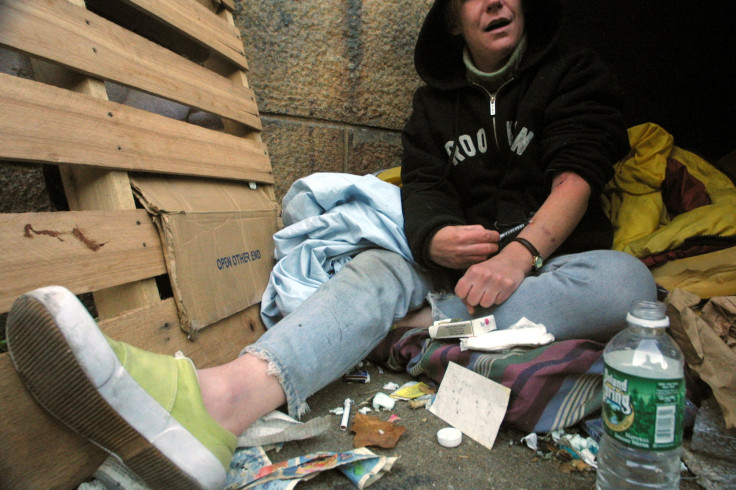Why Homeless In US Cannot Get Drug-Free Easily

The rising awareness against illegal drugs falls flat on its face when one of the major demographics of drug addicts – the homeless – cannot seek treatment for the same when they finally come to their senses.
Steven Kemp, a homeless guy who had been using heroin for a year and living on the streets of Philadelphia, staggered into a rehabilitation center Friday only to discover that he could not get admitted because he did not have a photo ID with him.
"If somebody goes in and says 'I need help,' they should get it," said Kemp, ABC reported. "I understand people have to get paid but you're supposed to be a health professional, you took an oath."
Most homeless people tend to misplace identifying documents that are mandatory during the screening processes for drug treatment facilities and without a stable address, phone number or a social security number, reapplying for the same becomes difficult. Seeking medical treatment for their drug problems become next to impossible in such cases. With the loss of urge to get treated, most of these people get back to being addicted to drugs.
Kemp was one of those people. After being denied admission to rehab, he spent the night trading items for buying Xanax and heroin and ended up taking drugs.
“It's Russian roulette every time you inject. We let them die from a treatable disease because they don't have an ID,” Dr. Corey Waller, chairman of the legislative advocacy committee of the American Society of Addiction Medicine, a group that represents addiction specialists, said, according to the ABC report.
Between 2007 to 2012, the number of heroin users doubled to 669,000 and while those seeking treatment increased from 277,000 to 450,000, there were still thousands who either refused treatment or could not avail the same for different reasons.
Other difficulties that drug addicts often end up facing when they express the desire to be checked into a rehabilitation center are the lack of beds in busy facilities and the unwillingness of insurance companies to cover the costs of hugely expensive treatments. Salvatore Marchese, a 26-year-old man from Blackwood, New Jersey, came face to face with the lack of options to cure his drug addiction when he was repeatedly turned away from hospitals because he did not have enough money to cover the cost of his anti-drug treatments.
Marchese had gone from abusing Marijuana and prescription painkillers to becoming addicted to heroin. According to Business Insider, when Marchese sought treatment for his condition in June 2010, doctors told him that they could not keep him under observation as heroin withdrawal was not life-threatening. Instead, he was given an IV flush to clean out his system and was sent home.
Read: Why Are Drug Prices 3 So High? The Fight Over A Price-Gouging Bill
Even though Heroin withdrawal is not life threatening, it can be very painful for the addict as he/she goes through sensations of their bones being broken. In addition to that, they also tend to break out in cold sweats and suffer from sudden chills. These factors cause many to give up and go back to using drugs again.
It was only when Marchese’s sister called up an inpatient treatment center and told them that her brother had been using heroin with alcohol that a medical facility agreed to take him in. As it happens, heroin coupled with alcohol cause fatal seizures. However, even then, Marchese was discharged after just 17 days. He was found dead three months later with a needle stuck up in his arm.
"Insurance companies need to understand that this is a disease," said his mother, Patty DiRenzo. "Heroin is life-threatening, I don't care what they say. Because we're losing kids every day from it."
© Copyright IBTimes 2024. All rights reserved.






















